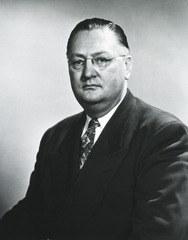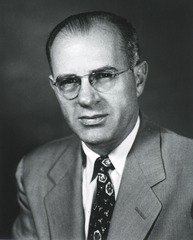National Institutes of Health Clinical Center
(Redirected from Mark O. Hatfield Clinical Research Center)
National Institutes of Health Clinical Center (NIH Clinical Center) is a premier hospital and research center located in Bethesda, Maryland, USA. It is part of the National Institutes of Health (NIH), an agency of the United States Department of Health and Human Services. The Clinical Center is dedicated to clinical research and has been at the forefront of medical innovation since its inception in 1953.
Overview[edit | edit source]
The NIH Clinical Center is known for its role in advancing clinical research and translating scientific observations and laboratory discoveries into new approaches for diagnosing, treating, and preventing disease. It is the world's largest hospital entirely dedicated to clinical research. The facility operates under the principle that collaboration between researchers and clinicians can expedite the delivery of treatments to patients.
Facilities and Services[edit | edit source]
The Clinical Center offers a wide range of services and facilities designed to support the complex needs of research and patient care. This includes state-of-the-art laboratories, imaging services, and a research pharmacy. The hospital is equipped to handle a variety of medical conditions and diseases, with a focus on rare and severe diseases that require specialized research and treatment.
Research and Innovations[edit | edit source]
Research at the NIH Clinical Center covers a broad spectrum of medical fields, including oncology, infectious diseases, cardiovascular diseases, and neurological disorders. The center is known for its pioneering work in developing new medical technologies, treatments, and therapies. Many of these advancements have had a significant impact on medical practice worldwide.
Patient Care[edit | edit source]
Patient care at the Clinical Center is closely integrated with its research mission. Patients participating in clinical trials receive highly specialized care and access to new therapies and treatments before they are widely available. The center's unique model allows patients to contribute to medical research while receiving top-tier medical care.
Education and Training[edit | edit source]
The NIH Clinical Center also serves as a training ground for future scientists and healthcare professionals. It offers a range of educational programs, internships, and fellowships designed to prepare the next generation of researchers and clinicians. These programs emphasize interdisciplinary collaboration and hands-on experience in clinical research.
Collaborations[edit | edit source]
The Clinical Center collaborates with academic institutions, industry, and other government agencies to accelerate the development of innovative treatments. These partnerships leverage the center's research capabilities and resources to tackle complex health challenges and improve patient outcomes.
Conclusion[edit | edit source]
The NIH Clinical Center stands as a testament to the critical role of clinical research in advancing medical science and improving public health. Its commitment to research, patient care, and education continues to contribute to significant medical breakthroughs and the development of new therapies and treatments.
Transform your life with W8MD's budget GLP1 injections from $125
W8MD offers a medical weight loss program NYC and a clinic to lose weight in Philadelphia. Our W8MD's physician supervised medical weight loss centers in NYC provides expert medical guidance, and offers telemedicine options for convenience.
Why choose W8MD?
- Comprehensive care with FDA-approved weight loss medications including:
- loss injections in NYC both generic and brand names:
- weight loss medications including Phentermine, Qsymia, Diethylpropion etc.
- Accept most insurances for visits or discounted self pay cost.
- Generic weight loss injections starting from just $125.00 for the starting dose
- In person weight loss NYC and telemedicine medical weight loss options in New York city available
- Budget GLP1 weight loss injections in NYC starting from $125.00 biweekly with insurance!
Book Your Appointment
Start your NYC weight loss journey today at our NYC medical weight loss, and Philadelphia medical weight loss Call (718)946-5500 for NY and 215 676 2334 for PA
Search WikiMD
Ad.Tired of being Overweight? Try W8MD's NYC physician weight loss.
Semaglutide (Ozempic / Wegovy and Tirzepatide (Mounjaro / Zepbound) available. Call 718 946 5500.
Advertise on WikiMD
|
WikiMD's Wellness Encyclopedia |
| Let Food Be Thy Medicine Medicine Thy Food - Hippocrates |
Translate this page: - East Asian
中文,
日本,
한국어,
South Asian
हिन्दी,
தமிழ்,
తెలుగు,
Urdu,
ಕನ್ನಡ,
Southeast Asian
Indonesian,
Vietnamese,
Thai,
မြန်မာဘာသာ,
বাংলা
European
español,
Deutsch,
français,
Greek,
português do Brasil,
polski,
română,
русский,
Nederlands,
norsk,
svenska,
suomi,
Italian
Middle Eastern & African
عربى,
Turkish,
Persian,
Hebrew,
Afrikaans,
isiZulu,
Kiswahili,
Other
Bulgarian,
Hungarian,
Czech,
Swedish,
മലയാളം,
मराठी,
ਪੰਜਾਬੀ,
ગુજરાતી,
Portuguese,
Ukrainian
Medical Disclaimer: WikiMD is not a substitute for professional medical advice. The information on WikiMD is provided as an information resource only, may be incorrect, outdated or misleading, and is not to be used or relied on for any diagnostic or treatment purposes. Please consult your health care provider before making any healthcare decisions or for guidance about a specific medical condition. WikiMD expressly disclaims responsibility, and shall have no liability, for any damages, loss, injury, or liability whatsoever suffered as a result of your reliance on the information contained in this site. By visiting this site you agree to the foregoing terms and conditions, which may from time to time be changed or supplemented by WikiMD. If you do not agree to the foregoing terms and conditions, you should not enter or use this site. See full disclaimer.
Credits:Most images are courtesy of Wikimedia commons, and templates, categories Wikipedia, licensed under CC BY SA or similar.
Contributors: Prab R. Tumpati, MD







